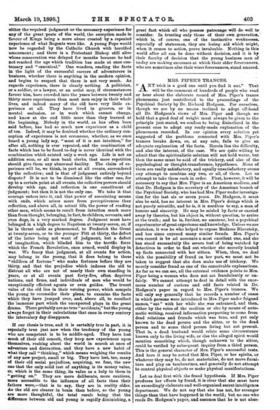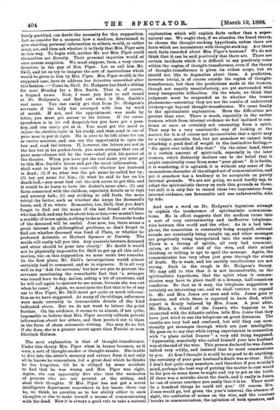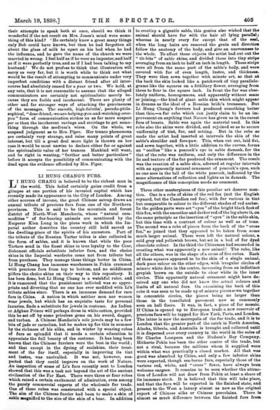MRS. PIPER'S TRANCES.
"ANY trick is a good one until you find it out." That will be the comment of hundreds of people who read or hear about the elaborate record of Mrs. Piper's trance phenomena just contributed to the proceedings of the Psychical Society by Dr. Richard Hodgson. For ourselves, though we are by no means inclined to adopt off-hand all Dr. Hodgson's views of Mrs. Piper and though we hold that a good deal of weight must always be given to the principle just stated, we confess to being disinclined in the present case to adopt any ready-made explanation of the phenomena recorded. In our opinion every solution yet suggested of the problems connected with Mrs. Piper's trances breaks down, or, at any rate, fails to give an adequate explanation of the facts. Herein lies the difficulty, and also the interest, of the case. We are quite willing to admit that the spiritualistic solution will not hold water, but then the same must be said of the trickery, and also of the psychological or thought-transference, hypotheses. None of them are really satisfactory, and equally unsatisfactory seems any attempt to combine any two, or all, of them. Let us attempt to take them each in order. First, however, it will be necessary to say that Mrs. Piper is an American medium, and that Dr. Hodgson is the secretary of the American branch of the Psychical Society, who has had Mrs. Piper under investiga- tion for the last six or seven years. Dr. Hodgson, it must also be said, has no interest in Mrs. Piper's doings which is not purely scientific, and he is, it is needless to say, a man of honour and sincerity. He may be misled by facts or carried away by theories, but his object is, without question, to arrive at the truth ; and he is, further, no amateur, but a psychical experimenter of great experience and knowledge. Unless we are mistaken, it was he who helped to expose Madame Blavatsky, and has since exposed many similar frauds. Mrs. Piper's own record is be all accounts a most excellent one, and she has stood successfully the severe test of being watched by detectives in order to find out whether she secretly hunted up facts connected with her sitters. When, then, we deal with the possibility of fraud on her part, we must not be taken to suggest that she does make use of trickery. We merely consider fraud as one of the conceivable explanations. As far as we can see, all the external evidence points to Mrs. Piper being a woman who does not act fraudulently or un- fairly. We cannot attempt to deal in detail with the enor- mous number of curious and odd facts related in Dr. Hodgson's paper in regard to Mrs. Piper's trances. We will only say generally that he records a number of cases in which persons were introduced to Mrs. Piper under feigned names, " sat " with her while she was entranced, and then, either by the voice of the medium or else by means of auto- matic writing, received information purporting to come from dead relations and friends which was true, and yet only known to the dead person and the sitter, or to the dead person and to some third person living but not present. That is, a dead husband would relate some circumstance known only to the living wife, or else the alleged spirit would mention something which, though unknown to the sitter, could be verified by subsequent inquiry from a third person. This is the general character of Mrs. Piper's successful tests. And here it may be noted that Mrs. Piper, or her spirits, or whatever they may be, do not materialise, do not move furni- ture and play on tambourines, and generally do not attempt to control physical objects or make physical manifestations.
Let us deal first with the fraud hypothesis. If Mrs. Piper produces her effects by fraud, it is clear that she must have an exceedingly elaborate and well-organised secret intelligence department. We do not say that she has not, for stranger things than that have happened in the world; but no one who reads Dr. Hodgson's paper, and assumes that he is not abso- lately purblind, can doubt the necessity for this supposition. Let us consider for a moment how a medium, determined to give startling personal information to sitters, would, or rather must, act, and then ask whether it is likely that Mrs. Piper acts in this way. To begin with, neither Mr. nor Mrs. Piper could themselves act directly. Their personal inquiries would at once arouse suspicion. We must suppose, then, a very clever detective in the pay of Mrs. Piper. Let us call him Mr.
Skill, and let us try to imagine the sort of instructions which would be given to him by Mrs. Piper. Mrs. Piper would, in the supposed case, have to address her detective somewhat after this fashion Come in, Skill. Dr. Hodgson has fixed a sitting for next Monday for a Mrs. Smith. That is, of course, a feigned name. Now, I want you first to call round
at Dr. Hodgson's, and find out what is Mrs. Smith's real name. You can easily get that from Dr. Hodgson's servants if the lady has arranged with him by word of mouth. If not, and the appointment was made by letter, you must get access to his letters. If the corre- spondence is in his red despatch-box you have got a pass- key, and can easily get at it. You must get the maid to injure the electric-light in his study, and then send in one of your men to put it right. He is sure to be left alone for ten or twelve minutes, and can use the opportunity to open the box and read the letters. If, however, the letters are not in the box but in his pocket-book, you must arrange that one of your men—James will be the best—shall pick his pocket at the theatre. When you have got the real name you must go to this Mrs. Smith's house and get the usual information. I shall want to know in this case—(1) whether her husband is dead ; (2) if so, what was the pet name he called her by ; (3) her pet name for him ; (4) what he said to her on his death-bed,—you must find out the sick-nurse to get this, and it would be no harm to have the doctor's name also; (5) any facts connected with the children, especially details as to toys and nursery talk ; (6) any striking or odd facts, the more trivial the better, such as whether she keeps the deceased's boots, and, if so, where. Remember, too, Skill, that you don't forget to find out the name of the last friend or relation who has died, and any facts about him or her,—we mustn't have a muddle of sexes again, nothing looks so bad. Favourite books of the deceased will be useful. Just now, too, there seems a great interest in philosophical problems, so don't forget to find out whether deceased was fond of Plato, or whether he preferred Aristotle or Herbert Spencer or Darwin. The maids will easily tell you this. Any quarrels between deceased and sitter should be gone into closely.' No doubt it would not be physically impossible for Skill to get up all this infor- mation, but on this supposition we must make two remarks. In the first place, Mr. Skill's investigations would almost certainly lead to comment, and so to exposure. It is all very well to say 'Ask the servants,' but how are you to prevent the servants mentioning the remarkable fact that 'a stranger was round here to-day, ma'am, asking a lot of questions, and he will call again to-morrow to see nurse, because she was out when he came.' Again, we must note the fact that to be of any use to Mrs. Piper, Mr. Skill must get quite as much informa- tion as we have suggested. At many of the sittings, references were made correctly to innumerable details of the kind indicated above. But we do not want to labour the point further. On the evidence, it seems to us almost, if not quite, impossible to believe that Mrs. Piper secretly collects private information about her sitters, and then pours it out to them in the form of sham automatic writing. She may do so, but if she does, she is a greater secret agent than Fouche or even Sherlock Holmes.
The next explanation is that of thought-transference. Under this theory Mrs. Piper when in trance becomes, as it were, a sort of thought-sucker or thought-stealer. She is able to dive into the sitter's memory and extract from it not only all he knows he remembers, but a great deal which he thinks he has forgotten, till he is obliged by some accident to find that he was wrong and Mrs. Piper was right. Again, she can apparently dive also into the memories of persons who are not present at the sitting, and steal their thoughts. If Mrs. Piper has not got a secret intelligence department somewhere in her house, there can be, we think, no question as to her ability either to suck thoughts or else to make herself a means of communicating with the dead. Now it is always a good rule to take a natural explanation which will explain facts rather than a super- natural one. We ought then, if we abandon the fraud theory, to choose the thought-sucking hypothesis, unless there are facts which are inconsistent with thought-sucking. Are there such facts recorded about Mrs. Piper's trances ? We do not think that it can be said positively that there are. There are certain incidents which it is difficult to say positively come within the region of thought-transference, even if the theory of thought-transference is given its widest scope, but we should not like to dogmatise about them. A prediction, however trivial, is of course outside the region of thought. transference, but then the predictions made at the trances, though not exactly unsatisfactory, are yet surrounded with many insuperable difficulties. On the whole, we think that judgment must be suspended as to whether the trance phenomena—assuming they are not the results of undetected trickery—go beyond thought-transference. We come finally to the spiritualistic explanation. Here the difficulties are greater than ever. There is much, especially in the earlier trances, which from internal evidence we feel inclined to con-
demn at once as certainly not emanating from a spirit. That may be a very unscientific way of looking at the matter, for it is of course not inconceivable that a spirit may be a vulgar, maudlin fool, but yet somehow we cannot help attaching a good deal of weight to the instinctive feeling,— " No spirit ever talked like that." On the other hand, there is a certain amount of spirit-talk, especially in the later trances, which distinctly inclines one to the belief that it might conceivably come from some "poor ghost." It is feeble, it is wandering, it is agitated, it is without any sense of the momentous character of the alleged act of communication, and yet it somehow has a tendency to be acceptable on purely internal grounds. We are not going, we need hardly say, to adopt the spiritualistic theory on such thin grounds as these, but still it is only fair to record these two impressions from internal evidence, one favourable and one unfavourable, side by side.
And now a word on Dr. Hodgson's ingenious attempt to explain the incoherence of spiritualistic communica- tions. He in effect suggests that the medium turns into a sort of very untrustworthy and ineffective telephone- wire between this world and the other. As in a bad tele- phone, the connection is constantly being snapped, external sounds are constantly being caught up, and other messages are perpetually being interpolated into the main message. There is a throng of spirits, all very bad communi- cators, at the other end of the wire, and their mixed thinking or talking is apt to spoil the message. Again, the communicator has very often just gone through the strain of death. He is weak, and his earthly recollections are not strong. Such in the rough is Dr. Hodgson's theory. We may add to this that it is not inconceivable, on the spiritualistic hypothesis, that the spirit when it commu- nicates may have to place itself in a dreamy, half-conscious condition. Be that as it may, the telephone suggestion is certainly an interesting one, and we shall venture to expand it. Mr. and Mrs. Jones are man and wife. Jones goes to America, and while there is reported to have died, which report is firmly believed by Mrs. Jones. A year after, Mr. Black, a friend of the Jones's, who happens to be connected with the Atlantic cables, tells Mrs. Junes that they have just tried to use the telephone on great distances. The results are very bad and confused, but still they can occa- sionally get messages through which are just intelligible. He goes on to say that while trying experiments in connection with "a place called Denver" a very odd thing happened. Apparently, somebody who called himself your late husband was at the end of the wire. This person declared he was Jones, talked very wildly, and insisted that he must communicate to you. At firstI thought it would be no good to do anything, the certainty of your poor husband's death was so clear. Still, I don't feel quite easy somehow, and therefore if you wouldn't mind, perhaps the best way of putting the matter to rest would be for you to come down to-night and try to get at the truth. If there was a mistake about the death, and it really is Jones, he can of course convince you easily that it is he. There must be a hundred things he could tell you.' Of course, Mrs. Jones would go, but given the year's interval, the absence of sight, the confusion of noises on the wire, and the constant breaks in communication, the agitation of both speakers, and their attempts to speak both at once, should we think it wonderful if the net result on Mrs. Jones's mind were some- thing of this kind? He certainly knew a great many things only Bob could have known, but then he had forgotten all about the glass of milk he upset on his bed when he had the influenza, and he gave the name of the church we were married in wrong. I feel half as if he were an impostor, and half as if it were perfectly true, and as if I had been talking to my husband.' We do not profess to think that illustration will carry us very far, but it is worth while to think out what would be the result of attempting to communicate under very imperfect conditions with a distant friend after all inter- course had absolutely ceased for a year or two. We hold, at any rate, that it is not reasonable to assume that the alleged communicators are certainly not spiritualistic merely be- cause they are feeble and incoherent. There are plenty of other and far stronger ways of attacking the genuineness of the messages. The smooth, high-falutin', pseudo-philo- sophical, "dear-friend,-we-are-helping-you-and-watching-over- you" form of communication strikes us as far more suspect per se than the incoherent ravings and strivings to get some- thing through the medium's wires. On the whole, we suspend judgment as to Mrs. Piper. Her trance phenomena are certainly very strange, and raise many points of great interest, but till a great deal more light is thrown on her case it would be most unwise to declare either for or against the spiritualistic value of her trances. Mankind will want, and be right in wanting, "further and better particulars" before it accepts the possibility of communicating with the dead upon the evidence afforded by Mrs. Piper.








































 Previous page
Previous page